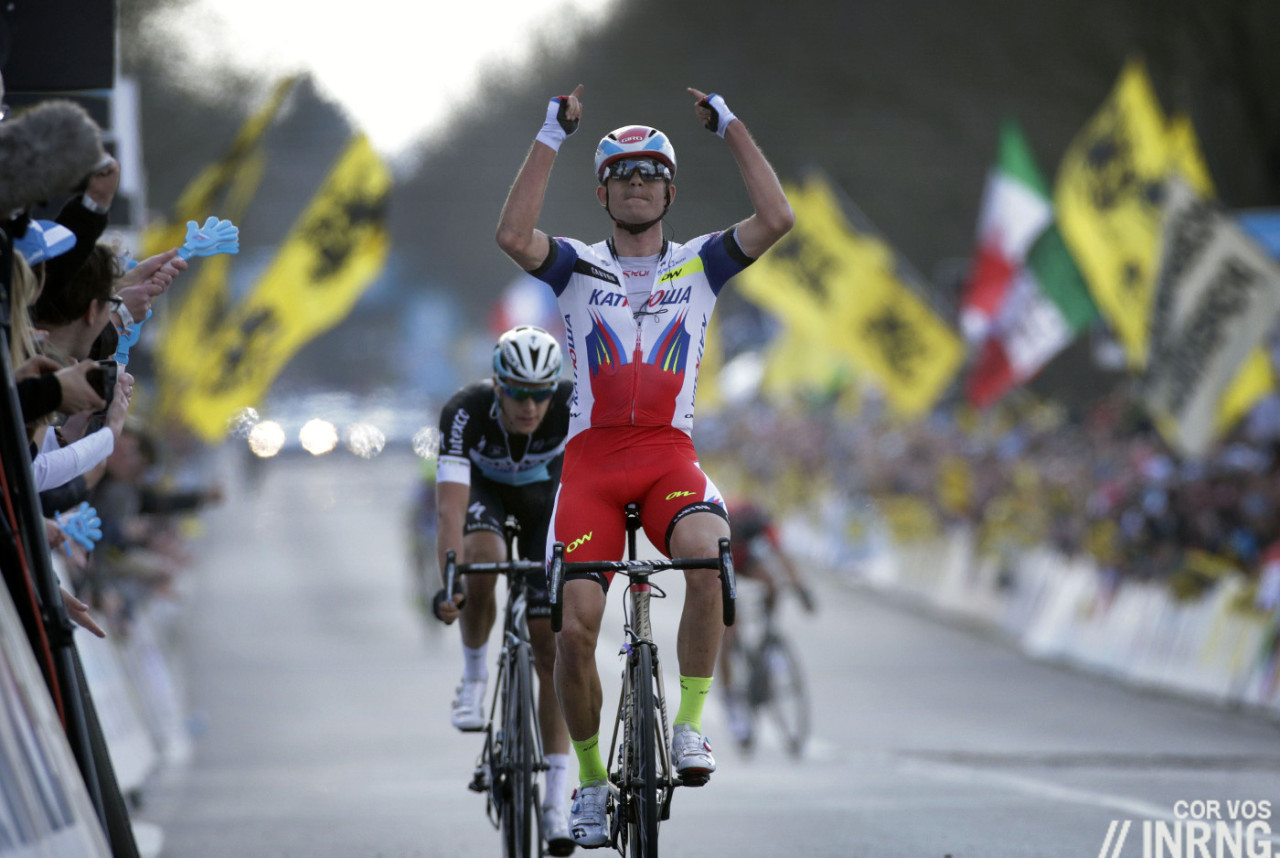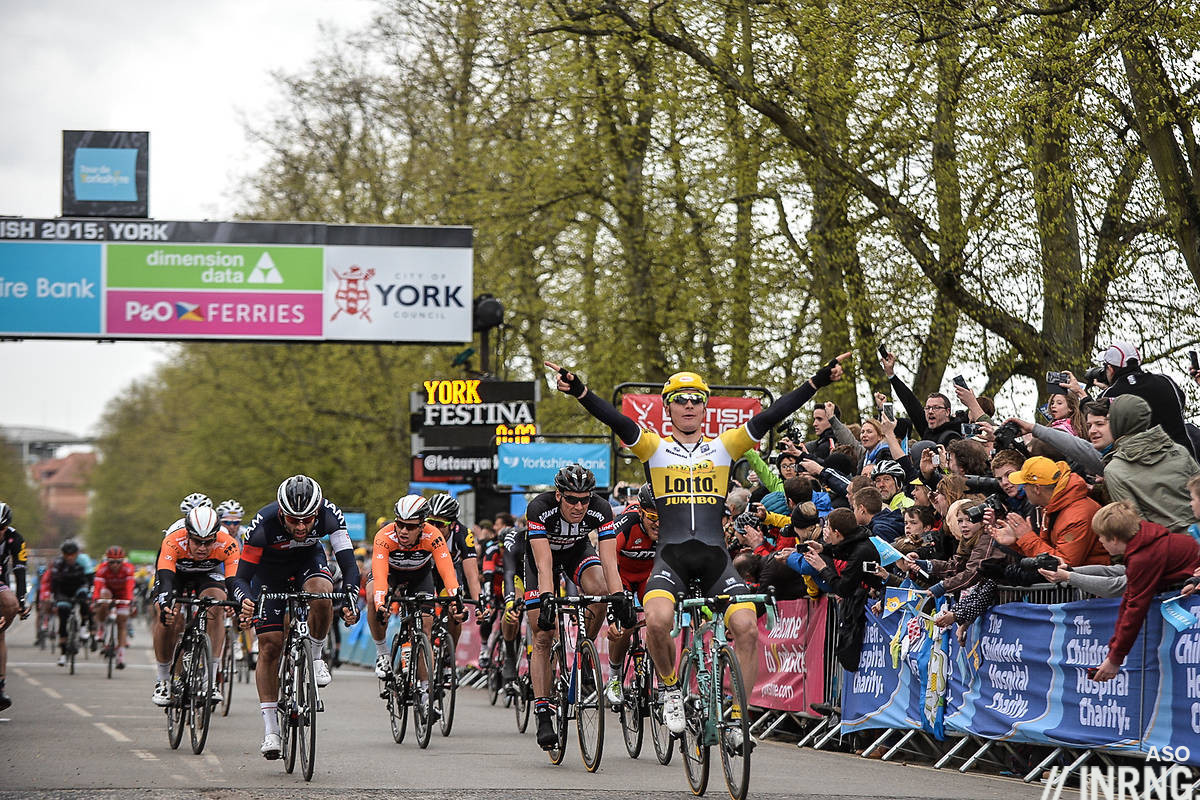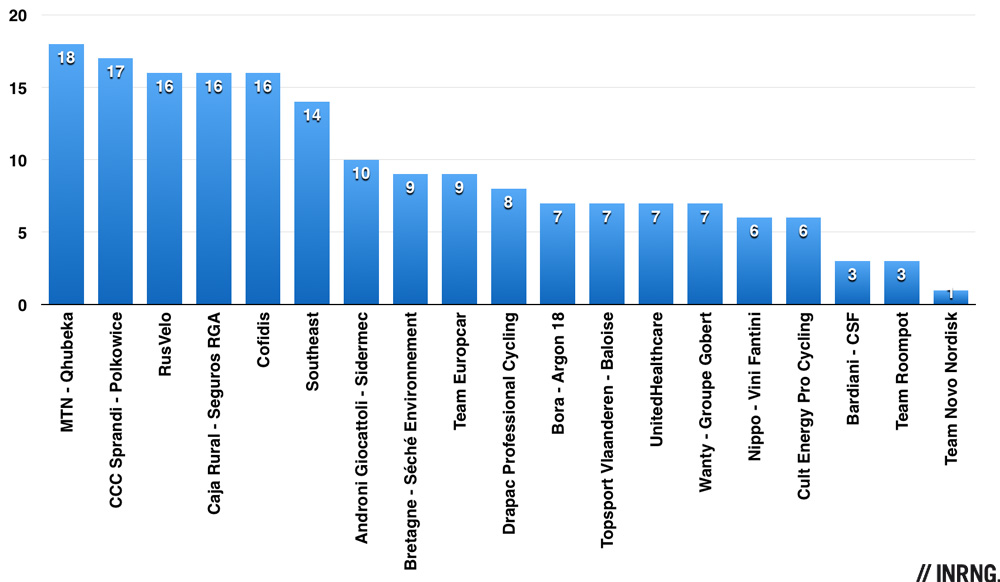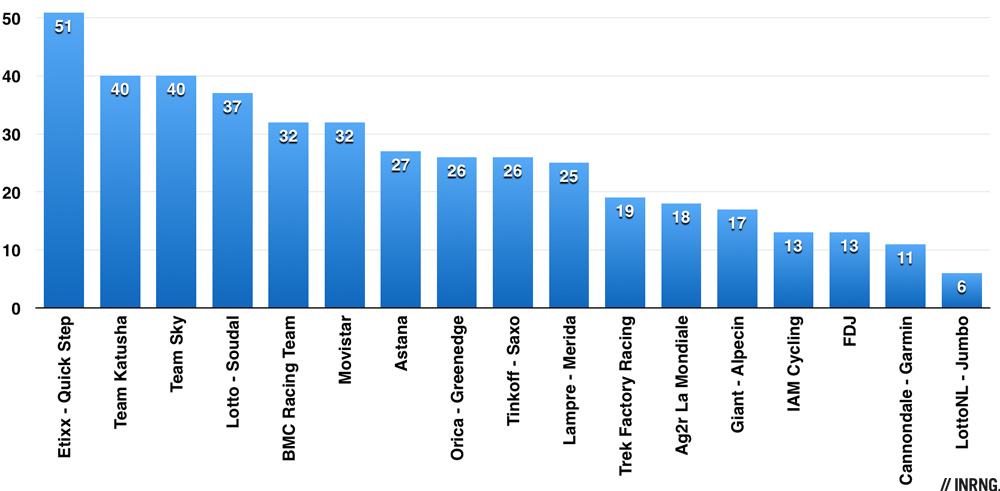2015 is drawing to a close you might think that excluding the World Championships and its national team format there are only a few races to go like Paris-Tours and the Tour of Lombardy but there are still 66 days of racing left on the pro calendar, although half of these come from Chinese races where few World Tour teams venture.
For now Etixx-Quickstep lead the rankings and look set to stay at the top thanks because they’re so far ahead of the others. Scanning the chart Lotto-Soudal’s excellent season is visible and Marcel Kittel’s absence for much of the season is visible for Giant-Alpecin. As we’re well into the transfer season you can start to see some teams trying to change trajectory for 2016.
Etixx-Quickstep win on quantity but quality is debatable: 51 wins and eight in the World Tour. Timing matters and they got three stage wins in the Tour de France plus the Amstel Gold Race but they’ve racked up a lot in races like the Tour de Poitou Charentes and the Czech Tour where’s there’s not much TV coverage. Still it’s been an excellent season and the team is packed deep with talent, even stagiaires win like Fernando Gaviria. World champion Michał Kwiatkowksi can be missing from results but others take his place; if this happened on another team they’d be asked weekly for explanations.

Alexander Kristoff has scored half of Katusha‘s wins. He had a lull during the Tour de France but is looking good for the end of the season and the upcoming World Championships. Joaquim Rodriguez has scored six so if he struggles to win a grand tour there’s still action along the way. It’s not all be champagne and joy with Luca Paolini’s Tour de France cocaine test and Giampaolo Caruso’s EPO retest, both of which rumble on.
Lotto-Soudal are next thanks to André Greipel’s great season. It wasn’t long ago that the team rhymed with chaos, not merely underdogs to compatriots Etixx-Quickstep but error prone. Now they seem more cohesive, perhaps it’s a sharper focus on winning? This might sound an obvious goal but they spent years and resources chasing the overall classification in grand tours and this has ended. It leaves Lotto-Soudal to focus on sprints and bringing on punchy riders like Tim Wellens, Tony Gallopin and Tiesj Benoot. Jens Debusschere and the recovering Kris Boeckmans have brought more sprint wins.
Tinkoff-Saxo sit mid-table. Alberto Contador won the Giro without taking a stage so a big win but without the additional score. Keen as ever, Oleg Tinkov says he wants to win all three grand tours and a monument classic in 2016 but how? The team’s got a Danish exodus led by Matti Breschel, he’s been good for a few wins and crucially one of the few riders left in support of Peter Sagan during the classics; the Slovak will arguably have less support than he did at Cannondale. There was talk Mikel Nieve to help Contador and Majka but won’t happen so they need more to turn dreams into reality.
Team Sky tend to be seen as specialists in the set-piece stage races and Chris Froome’s Tour de France win is the obvious highlight. There’s the Dauphiné, Paris-Nice, the Giro del Trentino and more as target races but they’ve won more across the board with Elia Viviani proving a judicious signing from Cannondale with a handy seven wins including three in the recent Tour of Britain.

17 wins only four teams with less, it would have sounded very disappointing for Giant-Alpecin at the start of the year. With a fully fit Marcel Kittel they’d be on, what 27 or more wins? More if Luka Mezgec was doing better too. But the 17 and everything else marks a very successful season thanks to John Degenkolb’s spring classics and Warren Barguil and Tom Dumoulin promising Tour and Vuelta rides. But promise is just that, the hope of something better in the future and confirming is big ask.
Trek Factory Racing have a conundrum, do they spend all their budget on a few big names or hire prospective talent and hope a few flowers bloom? Fabian Cancellara can deliver big but it’s been a bad year for him with crashes but there’s also a sense he’s approaching retirement which will free up a big chunk of the team’s wage bill. Niccolo Bonifazio and Edward Theuns should deliver wins in 2016, especially if Theuns sees the promotion from Topsport Vlaanderen as a stepping stone to bigger things rather than believing he’s made it by signing for a World Tour team. Kiel Reijnen is the latest in a line of US riders to make the transition from US racing to Euro racing but in recent years nobody has swapped a breakout performance in the US for big wins in Europe.
Cannondale-Garmin sit second last. They’ve been very active in the transfer market recruiting the likes of Pierre Rolland, Rigoberto Uran, Lawson Craddock… all are strong and entertaining but winners so the prospective win tally for 2016 doesn’t look too high. They will count on sprinter 25 year old sprinter Wouter Wippert for some wins but he’s not prolific, you might remember his win in the final stage of the Tour Down Under or his close calls in the Tour of California. The hope is he can improve and he at least brings sprint options which they didn’t have before and presumably comes at a keen price.

Last is Lotto-Jumbo, the Dutch squad were a late save last season thanks to new sponsorship but it meant a diminished budget compared to the high-spending Rabobank days against which it’s easy to make comparisons. But it’s not just money, something’s not quite clicked either. Robert Gesink had a great Tour de France (but no wins) while house sprinter Moreno Hofland has had a lot of DNFs and just two wins thanks to injury. Sep Vanmarcke’s struggles sums up the team’s season, they can’t get a lucky break at times which is something a lottery-funded team won’t like.
Pro Continental Teams

MTN-Qhubeka have 18 wins although one third of these come from national championship titles. They still count. With Mark Cavendish linked to the team it’ll be interesting to see how they handle their identity over the winter. Even if the Manxman doesn’t join they will no longer be the “first African team”. Instead they’re an established pro team and will be expected to ride like one.
CCC-Sprandi have had a good season and testimony to the resurgence of Polish cycling, a wider foundation that Michał Kwiatkowski and Rafał Majka. However second place in the table is achieved by winning smaller races like a stage win in the Tour of Croatia or the Baltyk-Karkonosze Tour. Maciej Paterski did get a stage of the Volta a Catalunya and Davide Rebellin keeps going too. If the Polish team won some lesser events, what of Rusvelo? They sit third but name one of their wins? In fact have you seen the jersey on TV? Russian readers can but otherwise this offshoot of the Russian track programme is not so famous.
Mission accomplished for Caja Rural thanks to Omar Fraile’s Vuelta mountains competition win and a regular presence in Spanish races all year. They represent a sponsor that has no interest outside of Spain but such is the calendar they must race abroad. By contrast Cofidis has operations in several countries and these pay for the team – budget €9 million – which relies on Nacer Bouhanni. He is good but underachieves and he’s been struggling to finish a grand tour for years.
Southeast are the best of the Italian teams but name a win? Not easy. Among the others Androni have resumed racing after their collective suspension. Bardiani-CSF have had a terrible season for an opportunistic team able to pounce many wins but saved by Nicola Boem’s Giro stage win.



The whole issue of quantifying “success” in pro cycling confuses me.
In the broadest sense, wins are good.
Wins = Points = Visibilty.
Everyone’s a winner baby.
Hmm, except points don’t matter so much at present.
OK so take points out of the equation.
Wins are still good.
Wins = Visibility, right ?
The win stats are from PCS Ranking.
So, Torku Sekespor (who ??) have had a good year (I presume..) on 18 x wins ; one more than Caja Rural, who I know have certainly had a pretty good year.
And Torku are only two wins behind MTN Qhubeka, who we would all agree have had a *fantastic* year.
At least I think they have, but they’re one win behind Trek Factory Racing, who have not had a good year.
Aghhh !
Can anyone define “success” in the world of Pro Cycling for me ?
List all the cyclists you know – they’re the good ones.
List all the cyclists your partner/friends/family know – they’re the successful ones.
List all the cyclists your partner/friends/family are sick of hearing about – they’re the really successful ones.
There’s probably some truth in that !
But, looking through some of Inrng’s archives on these team wins, this debate occurs with regularity.
Wins, points, visibility, budget and return on investment, morale, target audience demographics, and the importance of Le Tour are all relevant to varying degrees.
There doesn’t seem to be an answer that fits all.
Perhaps, in the end, it comes down to longevity.
Keeping someone somewhere happy.
I just don’t envy the DS’ trying to keep all the plates spinning, that’s all.
probably a sad commentary, but from a “team perspective”, i would say that if you manage to maintain the same primary sponsor for a period of years, then you are a “successful” team… the whole sport is beholden to sponsorship dollars, and i’d deem those who can keep those sponsorship dollars to be successful…
how do the “sponsors” define “success”? depends on the sponsor…
for commercial concerns, the point someone made about “AVE” the other day almost certainly is a large component… having a winning rider probably helps, and having recognizable AND likeable riders definitely helps (especially if the sponsor actually “does something” with them, e.g. orica)… although there are sponsors like lampre (who has been around forever) whose motivation mystifies me a bit… when i go shopping for an appliance, they aren’t stamped “made with lampre rolled steel”… so it isn’t something that i as a consumer can have a “brand loyalty” to…
for “ego sponsors”, there are different motivations… i would surmise that most of them want to win (since they didn’t get their money by being passive)… i would also surmise that some like the ego-massaging that comes with being a “star” (hi oleg!)…
as far as for the riders… success is defined by each individual… someone like contador or froome define successs by winning gt’s, and completing a gt that they don’t win is probably looked at as a lost opportunity by them… someone like the great adam hansen likely considers completing all the gt’s (while getting the kit on tv in a few breakaways and suicide attacks), to be a successful season… and for “unknown/unseen” domestiques, simply keeping their contract for another year defines success…
it’s a bit of a slop, isn’t it?
I think this is right… keeping a sponsor happy enough to continue paying the bills is a very good definition of success. That each sponsor will have different goals means that each team has different goals (and therefore different definition of success).
That said, I really don’t understand MTN’s justification for withdrawal from their sponsorship. They said “We feel we don’t have a return on that investment at the levels of comfort to us”. Really? What more could they have possibly expected the team to do?! Even just the invite to the TdF was more than they should have planned for… To have the team do so well and still think they underperformed suggested that had no idea what they were getting into…
i too wonder about that??
from this viewer’s perspective, the team certainly gave the sponsor a more than adequate return on their investment… as you allude to, the tdf exposure alone was probably worth more than what they paid for the whole season…
AND they were good…
@portemat @ccotenj
Every time that team gets publicity, every time that team has a rider interviewed, the mantra is always
“this will help us get to our target of 5000 African children on bikes”.
The Qhubeka charity drives the team, drives the publicity, drives the race invites. Nobody cares or bothers to mention the telephones. MTN pump in the money, Qhubeka get the kudos and the ROI.
It may be hard-nosed, it raises some uncomfortable questions, and you may not like it, but it can be understood and it shouldn’t come as a total shock that the primary naming sponsor on that team asks the question “what’s in it for us?” Might also help explain why there’s not a long queue to replace them.
Interesting point 5000 Bicycles.
But it also begs the question “Why did MTN get involved in the first place then” ?
Yours is a valid point to the thread in that it also demonstrates that the ranking table would seem to have zero relevance to that particular sponsor.
The team’s Tour de France debut was spectacular and they couldn’t have had any more television / publicity short of actually winning the thing.
Sponsors come and sponsors go.
And it has nothing to do with the ranking table.
@5000 bicycles…
that’s a fair point, and and i gotta admit, it is something i completely forgot about considering (insert face-palm here)…
while it is not up to me to question a sponsor’s motivation (after all, it is their money), i do wonder (like special eyes), what their expectations were… after all, cycling isn’t like nascar, where the drivers “thank their sponsors” every time someone puts a microphone in their face… if anything, it’s almost the exact oppposite, you almost never hear a cyclist refer to the teams sponsor in interviews… mtq is pretty unique in that they have a consistent message across their team that they always mention at every opportunity… fwiw, i can’t get upset with a sponsor when they leave, regardless of their motivation, again, it’s not my money…
for example… here is your “generic” post-race interview with a winner in each sport…
nascar…
interviewer: well, billy bob, that was a great day today…
billy bob: (takes long swig of whatever drink sponsors his team)… first, i want to thank budweiser, jimmy johns, sprint, insert a dozen other sponsors here. for being with us… (cheers from crowd)… yea, that budweiser chevy sure was fast tonight… (takes another long swig, interview continues, with sponsor names dropped liberally throughout)…
cycling…
interviewer: well, billy bob, that was a great day today…
billy bob: i had great legs, but i wasn’t sure i could do it, but the team believed in me, yada yada yada…
actually, right now i’m getting a bit of a chuckle thinking about someone as slick as carl edwards doing a post-cycling race interview… 🙂 he wouldn’t just get the name of the title sponsor in (several times), he’d get the manufacturer of every part of his bike in as well…
heck in nascar, even the announcers do it… they don’t get tires, they get “goodyear tires”… they don’t get fuel, they get “sunoco fuel”… and so on…
Quality. We all know what level a race is – parcours, riders, history, whether or not riders are just using it for training.
That’s how we know that 18 wins of blah-blah races don’t mean a whole lot – whatever a table might mean.
We all know that the Dauphine is a bigger race than Suisse, which is why the bigger riders prefer it.
for those of us who are immersed in the world of cycling, sure… “we” know all those things, and can pretty easily parse results because of the institutional knowledge that comes with being a long time hardcore fan…
problem is for the casual fan (or even worse for a “new” fan), “they” don’t have that knowledge that “we” have… “they” don’t know that the dauphine is a “better” race than the suisse… and they definitely don’t understand the nuances of racing… “we” know that talansky (not to pick on him, just picking a real obvious example) won the dauphine because others were screwing around, and that it wasn’t a precursor to him being a “real contender”…
or take the 2014 tdf… to “us”, that podium was understood to be a fluke… to those with lesser knowledge of the sport, it might not be seen that way…
i’m not totally disagreeing with you… but if someone is” new” (or someone who just has a casual interest) to the sport, i can easily understand how they could misinterpret results…
But it’s fun to learn.
I loved learning all about the different races, etc.
Casual viewers will never do that – but casual viewers will only ever watch the Tour.
yet another good point… it is fun… 🙂
true on casual viewers…
And this “casual fan” who has no knowledge about the races and WT, PCT and CT, WT,1.HC an 2.1, then studies PCS rankings and ask himself why 18 wins of a CT team are not the same that 18 of a Pro team? Interesting theory. I just don’t buy it.
If someone has no insight about how cycling works, he#ll hardly stumble across such statistics.
How does Orica-GreenEdge qualify? They did have a great first-week in both Giro and Vuelta. Entertaining team.
orica perfectly illustrates one of the couple big problems with cycling today…
entertaining team…
likeable riders…
very visible…
generally achieves what they set out to do…
promotes itself better than any other team in existence with snazzy videos, etc…
and STILL can’t get a sponsor to fill the “your name here” spot that “greenedge” currently fills…
if a team that does everything “right” (i know, some people are bothered by the presence of matt white, but still) can’t fill a sponsor slot, that is very telling…
Totally reminiscent of HTC – Highroad.
Homophone corner re Lotto Jumbo – “some up the team’s season” should be “sum up”
Would be interesting to see how wins are distributed within a team. For example, Etixx seem to have spread the wins around, so a (relative) failure by a marquee name has a lower impact. Indeed, for a team that had a “bad” Tour, they had a pretty successful Tour, with wins by three different riders even if Cavendish somewhat misfired. I get the sense that the forty wins from Sky have also been fairly well distributed, with Froome, Stannard, Thomas, Kennaugh, Roche etc all taking important and visible wins. Whereas with Katusha or Tinkoff – take out a couple of big stars from each and what do you have left? Didn’t TI Raleigh consign the days of the Van Looy Red Guard to history for good?
Tom
Got the typo, thanks.
Some of the distribution is mentioned above and once the season is over there will be a fuller piece on this including some more stats like this and comparisons between teams.
This article appears to have been written using voice recognition software, perhaps? ?
You forgot Team Colombia, unless you didn’t bother listing them because of their ZERO wins. Didn’t even show up in the bar graph LOL.
Exactly, they have yet to win anything. Perhaps I should have mentioned Roompot finally got some wins and made the chart.
It is a strikingly mysterious world of cycling economics.
ccotenj, nailed it i believe.
We may add in a bit of a bit of national pride to some of the trade teams.
There’s a real story in Colombia’s underperformance. OK, so they made concerted efforts (albeit unsuccessfully) to win KoM competitions but as a strategy this has cost them scoring ANY stage wins. There’s no excusing that record – it’s appalling. I wonder if next season they’ll be doing without a Grand Tour appearance for the first time in a while.
The interesting thing is that the rise to the mainstream of strong Colombian riders seems to have mirrored the decline of the ‘national’ pro team. Is this because all the top Colombians are poached early doors by WT teams, or a simple case of bad team management?
Yes, they did very little. But then the competition is not that strong – look at CCC in the Giro.
Marketing, which is what sponsorship is, is a funny thing. We measure wins as of success yet a valiant second place, or succession of, can gain greater public recognition than a win. The likes of Dumolin are an example (yes, I know he also won stages but we remember him most for hanging in on the climbs). Perhaps success should be measured in column inches, at least those heroic breakaways caught just before the line would get something for their efforts.
the “poulidor effect” at work…
“we” in the cycling fandom world DO like our “heroic, but ultimately unsuccessful” riders*, jens voigt is a living breathing example of that… i LOVE jens… i don’t think i’d love him nearly as much if he actually won more… it was the fact that he always tried and rarely succeded that made him so attractive… it also should be noted here that jens (like tommeke, and a few others) ALWAYS made time for the fans…
* not that poulidor was nearly as unsuccessful as the myth would have us believe…
Are teams still forced to go vegetarian during these Chinese races – or risk clenbuterol-poisoning?
Still think – all other reasons aside – that China shouldn’t have officially sanctioned races if they can’t provided drug-free meat.
i think if i was a team, i would bring all of the food with me… a logistical nightmare, especially for the underfunded teams, but i’d do everything possible to insulate the team from the chinese food chain…
What do you do with it when you get to the border crossing??
Team Colombia?